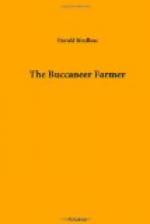Kit, pulling himself together, went out and faced the storm. The snow was thinner, but the wind had not dropped and buffeted him savagely as he struggled through a drift to the fold. The dogs had some trouble to drive out the sheep, and when they straggled through the opening Kit imagined the lambs went in front. In a few moments the flock vanished, and he breathed hard as he followed their track up hill. Now and then the dogs barked, but for the most part he heard nothing except the roar of the wind in the crags. He hoped the dogs could find the path across the narrow tableland between two branching ghylls, because it was obvious that his judgment might be at fault. However, there were the lambs; one could trust a Herdwick to return to its heaf.
When he reached the top the wind had blown away the snow, and he stood near the middle of a narrow belt of heath, with his feet sinking in a bog. On each side, he got a glimpse of dark rocks, streaked with white where the wind had packed the snow into the gullies. In front there was a gulf, down which his path led. Scattered snowflakes and rolling mist streamed up from the forbidding hollow. At first he could see nothing of the sheep, but as he floundered across the bog the dogs barked and he found them presently, guarding the flock in a hollow among the crags.
The sheep broke away and Kit pushed on across the narrow belt of bog that was dotted by the marks of little feet. Sometimes he slackened his pace to wait for Tom; the shepherd was getting old and the long climb had tired him. Both stopped for some moments when they reached the brow of the descent, and Kit, bracing himself against the storm tried to look about. He thought he saw the flock close in front.
“They seem doubtful where to go,” he said.
“We can do nowt but leave them to find t’ ghyll,” the shepherd remarked.
Kit agreed. Bleatarn ghyll was beneath him, but there was another hollow and it is hard to walk straight down hill in the dark. He must trust the sheep, and, huddling close together, they refused to leave the crag. When the dogs drove them out they vanished, and since the ground was bare of snow they left no tracks. He stumbled on, falling into pools and stumbling across banks of stones, and soon stopped again. He had come down the slope, so to speak, blindly, and now stood on the edge of a vast, dark pit. One could not see beyond the edge, but the confused noises that came up hinted at profound depth. The gale shrieked, but he heard the roar of falling water and the rattle of stones the wind dislodged.
“Do you think this is Beatarn ghyll?” he asked.
“I dinna ken,” Tom answered; and added hopefully, “if it’s t’ither, we’ll mayhappen find oot before we step over Ling Crag.”
They went down at a venture, whistling vainly for the dogs. The drop was very sharp, and now they were leaving the wind-swept pass, the snow had begun to pack among the stones and boggy grass. Still, so far as they could see, there were no marks of little feet and they wondered what had happened to the flock, until a faint bark came out of the mist. The noise got louder and Kit knew the dogs were running round the stopping sheep.




